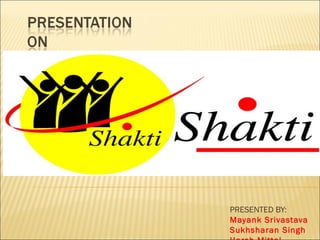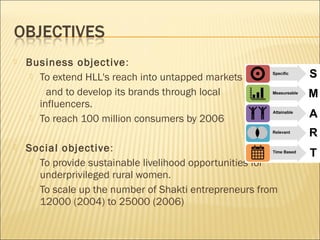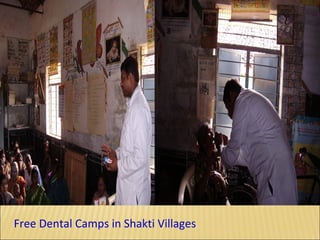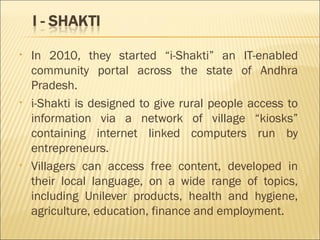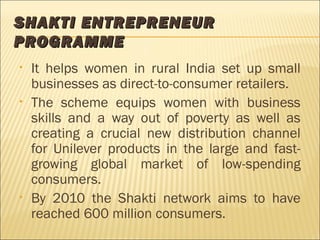Project Shakti HUL
- 1. PRESENTED BY: Mayank Srivastava Sukhsharan Singh Harsh Mittal
- 2. Unilever, the world's largest Fast Moving Consumer Goods (FMCG) company with a worldwide revenue of $55 billion. It's Indian subsidiary, the Hindustan Lever Limited (HLL) is the country's largest FMCG company with combined volumes of about 4 million tonnes and revenues $2.43 billion and 6.4 million retail outlets. HLL was an established brand in India, largely successful in urban regions.
- 3. Born in December 2000, in Nalgonda district of Andhra Pradesh. An ambitious venture by HLL to growth and penetration of its products in rural India while changing lives and boosting incomes. With the aim of increasing the company’s rural distribution as well as providing rural women income-generating opportunities.
- 4. Train Female Entrepreneurs who lived in Rural India and sells products of Hindustan Lever to the village markets while supporting the Independence of women. This is a case where the social goals are helping achieve business goals. Social goals = Supporting the independence of women. Business goals = Develop Sales Area.
- 6. • Villages with a population of about 2000-3000 are selected. • One Shakti entrepreneur is appointed for one village & villages that are about 2 kilometres apart from her village. • The Shakti dealer places initial orders worth Rs.15000(principal customer of HUL • The Shakti dealer organizes a “Shakti Day” in the village(display of products & free gifts)
- 7. Rural consumers are price sensitive Sachets and small packs of premium products. Price doesn’t exceed Rs.5 per sachet. Lux at Rs.5, Lifebuoy at Rs.2, Surf Excel sachet at Rs.1.50, Pond's Talc at Rs.5, Pepsodent toothpaste at Rs. 5, Fair & Lovely Skin Cream at Rs.5, Pond's Cold Cream at Rs.5, Brooke Bond Taaza tea at Rs.5.
- 8. AT RS.5 AT AT RS.2 RS.1.50 AT RS.6 AT RS.5 AT RS.5 AT RS.5 AT RS.5
- 9. Project Shakti plans to extend to the states of West Bengal, Punjab and Rajasthan. Partnership with other non-competitor companies to sell their products through the Shakti network. TVS Motor for mopeds, insurance companies for LIC policies.
- 10. Business objective: To extend HLL's reach into untapped markets and to develop its brands through local influencers. To reach 100 million consumers by 2006 Social objective: To provide sustainable livelihood opportunities for underprivileged rural women. To scale up the number of Shakti entrepreneurs from 12000 (2004) to 25000 (2006)
- 12. Strengths •Local knowledge of markets through Self- Help Groups (SHGs) •Technology necessary to operationalize the model Weakness • Skepticism in the minds of local people •Untrained women entrepreneurs Opportunities •Ever increasing demand due to untapped rural market •Increasing self awareness for hygiene, beauty ,etc. which would lead to high turnover over long run •Create a channel for brand communication •Integrating business with social responsibility Threats •Time taken by the project to break even •Competitor’s entry into rural market following the same model
- 14. • Integrated Multichannel System Shakti Entrepreneur s • Advantages: • Access to untapped market • Drawback: • Income Generated very small • No sense of belongingness • Advantages: • Responsibility was not shared among many • Income was not shared
- 15. Low margins . Difficulty in acquiring finance Less Transportation Low disposable income (dependence on monsoon)
- 16. It was soon felt that HUL's sales and distribution system which had protected it from competitors would be soon replicated by its rivals and to maintain its edge, the company had to increase its reach beyond the urban markets Carrying and forwarding agents(CFA) more than 70% of India's population lived in villages and made a big market for the FMCG industry
- 17. With lack of TV or Radio medium Promotion through demonstration of HUL products at the Haat Bazaar. Star sellers made up for this lack of audio-visual brand advertising.
- 18. PROGRAMMES UUNNDDEERRTTAAKKEENN SHAKTI VANI SHAKTI ENTREPRENEUR iSHAKTI COMMUNITY PORTAL
- 19. • Social communication anchored on brands – health and hygiene – women’s empowerment • Village women are recruited as Vanis and trained to communicate • Vani audience: key opinion leaders, schools, SHG meetings, other village gatherings. • Specially designed communication material – easy-to-carry kit: flip-charts, leave-behind posters, banners – content developed after in-depth understanding of local context
- 20. Free Health Camps in Shakti Village
- 21. Free Dental Camps in Shakti Villages
- 22. • In 2010, they started “i-Shakti” an IT-enabled community portal across the state of Andhra Pradesh. • i-Shakti is designed to give rural people access to information via a network of village “kiosks” containing internet linked computers run by entrepreneurs. • Villagers can access free content, developed in their local language, on a wide range of topics, including Unilever products, health and hygiene, agriculture, education, finance and employment.
- 23. SSHHAAKKTTII EENNTTRREEPPRREENNEEUURR PPRROOGGRRAAMMMMEE • It helps women in rural India set up small businesses as direct-to-consumer retailers. • The scheme equips women with business skills and a way out of poverty as well as creating a crucial new distribution channel for Unilever products in the large and fast-growing global market of low-spending consumers. • By 2010 the Shakti network aims to have reached 600 million consumers.
- 24. Low Pricing (LUPs) Brand Recognition (also Shakti Vani - HLL popularity due to Project Shakti) Distribution and Information Systems Community Development – iShakti, NGOs and SHGs Women Empowerment – Shakti Entrepreneur Customer Service Consumer for life
- 25. Delivers growth with its sales and distribution initiative Builds brands of HLL in the consumers’ mind Extends HLL’s reach into untapped markets Provides sustainable livelihood opportunities for underprivileged rural women Improves standard of living in rural India
